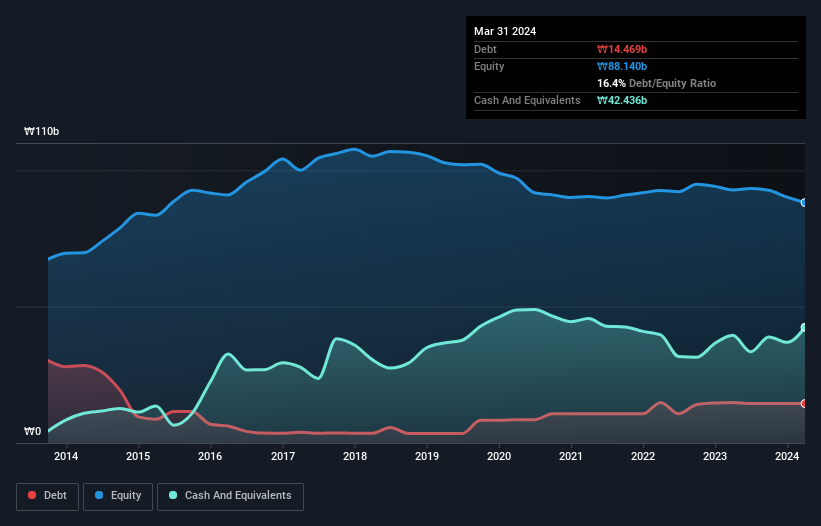
Warren Buffett famously said, 'Volatility is far from synonymous with risk.' When we think about how risky a company is, we always like to look at its use of debt, since debt overload can lead to ruin. As with many other companies SH Energy & Chemical Co., Ltd. (KRX:002360) makes use of debt. But the more important question is: how much risk is that debt creating?
When Is Debt A Problem?
Debt is a tool to help businesses grow, but if a business is incapable of paying off its lenders, then it exists at their mercy. Ultimately, if the company can't fulfill its legal obligations to repay debt, shareholders could walk away with nothing. However, a more frequent (but still costly) occurrence is where a company must issue shares at bargain-basement prices, permanently diluting shareholders, just to shore up its balance sheet. Of course, the upside of debt is that it often represents cheap capital, especially when it replaces dilution in a company with the ability to reinvest at high rates of return. The first step when considering a company's debt levels is to consider its cash and debt together.
Check out our latest analysis for SH Energy & Chemical
What Is SH Energy & Chemical's Debt?
As you can see below, SH Energy & Chemical had ₩14.5b of debt, at March 2024, which is about the same as the year before. You can click the chart for greater detail. However, its balance sheet shows it holds ₩42.4b in cash, so it actually has ₩28.0b net cash.

A Look At SH Energy & Chemical's Liabilities
According to the last reported balance sheet, SH Energy & Chemical had liabilities of ₩14.2b due within 12 months, and liabilities of ₩16.2b due beyond 12 months. On the other hand, it had cash of ₩42.4b and ₩18.5b worth of receivables due within a year. So it can boast ₩30.6b more liquid assets than total liabilities.
This surplus strongly suggests that SH Energy & Chemical has a rock-solid balance sheet (and the debt is of no concern whatsoever). On this view, lenders should feel as safe as the beloved of a black-belt karate master. Succinctly put, SH Energy & Chemical boasts net cash, so it's fair to say it does not have a heavy debt load! There's no doubt that we learn most about debt from the balance sheet. But you can't view debt in total isolation; since SH Energy & Chemical will need earnings to service that debt. So when considering debt, it's definitely worth looking at the earnings trend. Click here for an interactive snapshot.
Over 12 months, SH Energy & Chemical made a loss at the EBIT level, and saw its revenue drop to ₩130b, which is a fall of 17%. We would much prefer see growth.
So How Risky Is SH Energy & Chemical?
Although SH Energy & Chemical had an earnings before interest and tax (EBIT) loss over the last twelve months, it generated positive free cash flow of ₩5.5b. So taking that on face value, and considering the net cash situation, we don't think that the stock is too risky in the near term. With mediocre revenue growth in the last year, we're don't find the investment opportunity particularly compelling. The balance sheet is clearly the area to focus on when you are analysing debt. However, not all investment risk resides within the balance sheet - far from it. These risks can be hard to spot. Every company has them, and we've spotted 1 warning sign for SH Energy & Chemical you should know about.
When all is said and done, sometimes its easier to focus on companies that don't even need debt. Readers can access a list of growth stocks with zero net debt 100% free, right now.
New: Manage All Your Stock Portfolios in One Place
We've created the ultimate portfolio companion for stock investors, and it's free.
• Connect an unlimited number of Portfolios and see your total in one currency
• Be alerted to new Warning Signs or Risks via email or mobile
• Track the Fair Value of your stocks
Have feedback on this article? Concerned about the content? Get in touch with us directly. Alternatively, email editorial-team (at) simplywallst.com.
This article by Simply Wall St is general in nature. We provide commentary based on historical data and analyst forecasts only using an unbiased methodology and our articles are not intended to be financial advice. It does not constitute a recommendation to buy or sell any stock, and does not take account of your objectives, or your financial situation. We aim to bring you long-term focused analysis driven by fundamental data. Note that our analysis may not factor in the latest price-sensitive company announcements or qualitative material. Simply Wall St has no position in any stocks mentioned.
About KOSE:A002360
SH Energy & Chemical
Produces and sells expandable polystyrene (EPS) resin products in Korea.
Mediocre balance sheet very low.
Market Insights
Community Narratives




